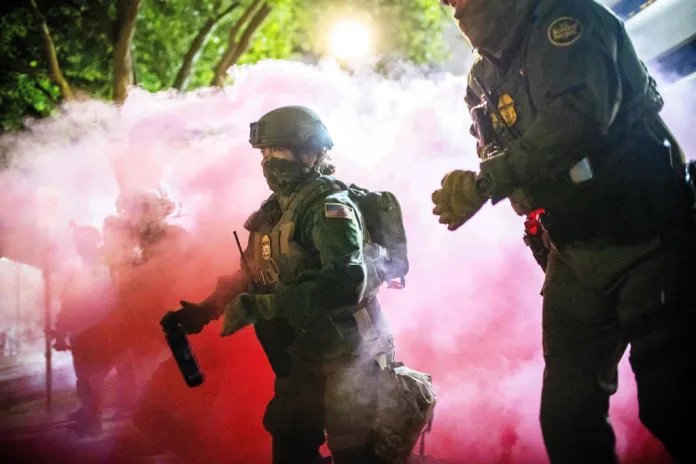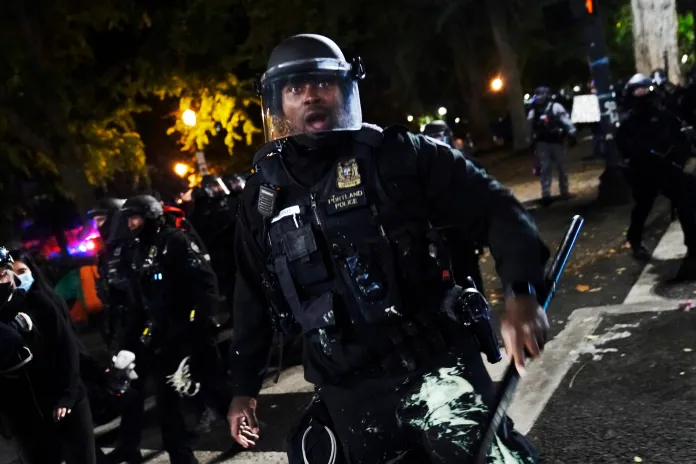The Portland Police Bureau is fending off attacks on several fronts from antifa’s forces laying siege on government property on a nearly nightly basis, to the public claiming that the police department is increasingly politicized, and not handling emergencies efficiently.
But the bureau’s problems, critics say, date back to soft-on-crime initiatives brought by anti-police activism and an institutional rot that has had a sprawling effect.
Riot response hampered by police reform
Sgt. Betsy Brantner Smith, spokeswoman for the National Police Association, noted that the law enforcement agencies serving the Portland area were once nationally recognized as leading crowd-control experts, primarily because Portland has been dealing with antifa’s forces for decades. Portland, a hotbed of antifa activity, is home to Rose City Antifa, the oldest-known antifa chapter in America.
HOW THE ANTIFA MOVEMENT HAS METASTASIZED
However, that generation of officers has since left Portland’s police force, Smith said.
“Cops who just wanted to do their job have aged out,” Smith told the Washington Examiner. “They have gotten out, bailed out, you might say.”
A decadeslong “slog” through different policies, procedures, and legislative changes drastically limited Portland police’s response capabilities, said Sgt. Aaron Schmautz, president of the Portland Police Association, represents all sworn officers below the rank of lieutenant within PPB.
In an interview with the Washington Examiner, Schmautz cited a slew of policing challenges that arose out of the 2020 racial justice riots in particular.
For instance, the Oregon legislature lessened the crime of interfering with law enforcement. Gov. Tina Kotek (D-OR), then-speaker of the Oregon House, had introduced and ultimately helped pass H.B. 3164, a bill prohibiting police officers from filing interference with an officer charges if the suspect “passively resists” police orders.
TOP AIDE TO OREGON GOVERNOR WAS ARRESTED AT 2020 ANTIFA RIOT
Anti-police efforts also placed significant restrictions on PPB’s use-of-force practices, such as the deployment of tear gas and rubber bullets, non-lethal dispersal tools that provide a safe standoff distance between encroaching protesters and the police line.
“That led to us having to be far more hands-on,” Schmautz said. “When police are hands-on with people, the risk of injury goes up, and the optics of using batons on citizens, the videos never look very good.”

Most devastating was the city slashing PPB’s budget by about $15 million in “equitable reallocations” due to the defund the police movement. “Our staffing just got destroyed,” Schmautz said. Portland police staffing levels currently stand at about 1.1 officers per 1,000 residents, less than half of the suggested average.
Sustained civil unrest continues to strain city resources.
Over the weekend, PPB faced criticism for not being present enough when there were 110 service calls across the city. “So that was 110 Portlanders who were experiencing some kind of crime or emergency,” Schmautz explained. “Their response was delayed by hours and hours and hours because we’re dealing with this unrest.”
“People say that the Portland Police Bureau does not care,” the police union boss added. “We care an awful lot, and we’re trying to police the entire city while also being very understaffed.”
A leftward lurch in leadership
Smith said PPB has become “so extraordinarily woke-ified” by the top brass.
PPB’s current Chief Bob Day moonlights as a diversity, equity, and inclusion consultant. Day runs a private DEI consulting firm called Reluctant Change, whose website was recently scrubbed following public backlash.
Portland’s previous Mayor Ted Wheeler, as acting PPB commissioner, joined protesters in 2020, inhaling alongside them a face full of tear gas.
Smith said political bias can leak downward from leadership to the rank-and-file through the recruitment process, leading to a whole-of-agency shift in culture and priorities.
A common misconception about police is that all American officers are conservative. “That’s just not true,” Smith, who represents officers nationwide, said. “When you look at a department like the Portland Police Bureau, that’s a very self-selective situation.”
Smith explained that officers will choose to work for specific agencies based on whether their beliefs align, especially in Democratic-led jurisdictions, where the populace tends to lean left. “So you’re likely to have people on the political Left at an agency like that.”
Accusations of uneven enforcement
PPB personnel stand accused of selectively enforcing the law after conservative influencer Nick Sortor was arrested on disorderly conduct charges while documenting antifa activity outside the Immigration and Customs Enforcement facility in South Portland.
Sortor says he had his camera broken by antifa militants who then threw multiple punches at him. When he alerted a nearby PPB patrol, officers took Sortor into custody “for fighting.”
In another high-profile altercation attracting attention, The Post Millennial reporter Katie Daviscourt was assaulted last week while covering the anti-ICE uprisings in Portland, but the Dialogue Liaison Officer (DLO) on scene did not arrest the suspect.
As captured on camera, a woman bashed Daviscourt in the face with a flagpole, leaving her concussed with a black eye.
“That is a felony-level assault,” Schmautz agreed. “It’s awful, and I am horrified that that happened. The specific incident involving that [DLO], though, is less about it being a dialogue officer, and more about our staffing problem.”
In a viral video of the incident circulating on social media, the DLO is seen speaking on the police radio and asking for available officers. As dispatch told him, PPB did not have any rapid response teams in the area at that time, Schmautz said, so the officer in question had to decide whether to take action independently, arrest Daviscourt’s assailant on his own, and risk the surrounding agitators swarming him.
“Based on everything that we know about this antifa-style group, they become very violent and group up,” Schmautz said.
According to PPB, the dialogue officer “attempted to talk to the suspect to hear her side of the story,” but she fled on foot. PPB is now requesting the public’s help in identifying her. “Sometimes arrests are not made at the scene when tensions are high, and arrests are made at a later date,” a PPB press release said.
During the George Floyd riots, PPB similarly issued be-on-the-lookout orders for suspects involved in far-left violence. Years later, those fugitives never faced justice, according to investigative journalist Andy Ngo. “These BOLOs about Antifa militants are a farce from the Portland Police,” alleged Ngo. “They don’t arrest them during the attack or after.”
Though a sworn PPB member, the DLO flagged down in Daviscourt’s case was assigned to the liaison role, the bureau said, and accordingly “cannot get involved in enforcement action.”
DLOs act as liaisons to demonstrators. Wearing distinct white shirts, DLOs work with organizers before, during, and after a demonstration to “get an idea of what that group is going to need to create or hold a safe space.”
“From a crowd control perspective, you want to have dialogue with the protesters,” Smith said.
As a caveat, she pointed to the potential for such community peacekeeping officers to be biased or compromised, particularly in a politically charged setting.
“Are they being too one-sided?” Smith questioned. “At what point do they just become part of the protesters?”
In May, the city of Portland published a profile of an exemplary DLO who “grew up going to protests” and finds it hard to remain neutral while overseeing protest-related operations. “Do you agree with them? It is our job as police officers to support their ability to express their views, but not to express our own opinions. That’s not easy!” DLO Jessica Ruch said in the Q&A section.
“We don’t have a riot squad anymore,” Ruch remarked. “That’s an antiquated model. That vocabulary implies that the entire group of protesters has a single mindset. That’s not what we see….We don’t want to be the bad guys.”

According to Smith, a former field training sergeant, what may be preventing some officers from making targeted arrests while patrolling the streets is the threat of workplace retaliation if higher-ups were to initiate disciplinary proceedings against them, coupled with a fear of physical violence from far-left actors.
“It’s become sort of a Stockholm syndrome,” Smith said of Portland police relations with antifa.
More than 180 consecutive nights of rioting in 2020 left many Portland officers physically injured and still traumatized from the onslaught.
“Our union hall was lit on fire and boarded shut with us in it,” Schmautz said. “A couple times.”
A police sergeant appeared to victim-blame Daviscourt and other right-wing reporters for their own attacks in an email included in Oregon’s emergency lawsuit filed to prevent President Donald Trump from deploying troops to protect federal property in Portland. Calling them “counterprotesters,” Sgt. Andrew Braun seemed to suggest that they invited the violence on to themselves by routinely reporting in dangerous places.
Smith raised concerns about equal protection under the law, saying the situation in Portland warrants further intervention from the Trump Justice Department.
“I think we’re seeing civil rights violations,” Smith said. “Law enforcement is supposed to protect everybody equally, regardless of race, sex, creed, sexual orientation, political affiliations, religious beliefs, all that.”
Assistant U.S. Attorney General Harmeet Dhillon, chief of the Trump DOJ’s civil rights division, announced on Friday that the department is investigating Portland police over an alleged pattern of politically motivated action and inaction.
Citing the Sortor arrest and the Daviscourt assault, Dhillon’s letter addressed to Day accused the city of using its policing powers in “a manner that may be based on viewpoint discrimination.”
The path forward for a peaceful Portland
As the dispute between Oregon officials and Trump’s administration settles in court, Schmautz wants to hear from the federal government about what a successful resolution would look like to restore peace to Portland.
“Any time you’re approaching conflict, you have to start searching for variables to make the problem less complicated to solve,” Schmautz said. “Right now, I just feel like we’re adding more variables instead of sitting down and having a real discussion.”
TRUMP OPEN TO INVOKING INSURRECTION ACT FOLLOWING ILLINOIS AND OREGON TROOP DEPLOYMENTS
Smith, meanwhile, urged local pro-police politicians to speak up about the policing problems plaguing Portland, both to call out city leadership and back the blue, regardless of government level and agency function.
Like other law enforcement officers, ICE agents enforce the laws Congress enacted, Smith said. “Use that bully pulpit to say, ‘Look, we need to support what all law enforcement is doing.’”
“Our officers are very supportive of other officers doing a different job,” Schmautz said. “We want to make sure that they’re safe, that they go home to their families. Most of the federal officers who are working at the ICE facility live in Portland. They’re constituents; they’re citizens in our city. They deserve to be supported. “
While officers out in the field may welcome a federal partnership, they must follow directives. “It’s never the line workers that are frustrated with each other. It’s management,” Schmautz said.
In 2020, the Portland City Council, which Schmautz said has historically been “very volatile towards police,” ordered PPB, via unanimous vote, not to coordinate with federal authorities sent in by the first Trump administration. That ban on interagency communication left local law enforcement in the dark on operational plans and intelligence gathering, Schmautz said, hence hindering overall police response.
TRUMP WHITE HOUSE LOOKS TO SLASH PORTLAND FUNDING, CITING ANTIFA ‘ANARCHY’
Amid the public vitriol over Portland’s standoff with the Trump administration, Schmautz lamented that ordinary officers are caught in the crossfire, castigated for carrying out their duties as ordered.
“There is a big divide between people just doing the work and the people who are giving the orders,” Schmautz said.

